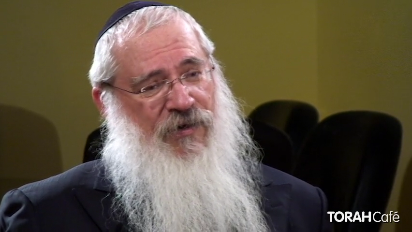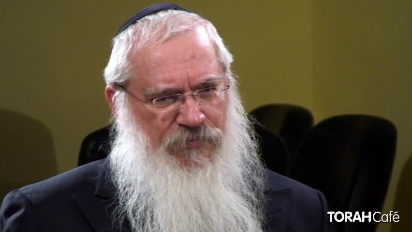-
Approaching a Rebel (2:55)
In the Passover Haggadah we have an example of a Jewish rebel- a Jew who wants to exclude himself from the Jewish Nation and not be part of "the people". How do we respond to such a person? Rabbi Manis Friedman has the answer in this short, insightful clip into a character of the Passover Haggadah.
Rabbi Manis Friedman (248)
-
The Definition of Slavery (5:21)
Rabbi Manis Friedman presents unique insights into the Passover Haggadah. On Passover we speak a lot about freedom, and breaking free from slavery. But do we really know the definiton of slavery? In this fascinating clip, Rabbi Manis Friedman provides viewers with the definition of slavery as well as tips on how to break free. .
Rabbi Manis Friedman (248)
-
 15:52
15:52
We Were Slaves... Modern-Day Slavery (15:52)
Rabbi Yossi Paltiel (56)
-
 6:15
6:15
The Four Sons (6:15)
We're all aware of the "Four Sons" addressed in the Haggadah, but did you know that there's a fifth son as well?.
Rabbi Yossi Paltiel (56)
-
 3:13
3:13
The Four Questions (3:13)
Rabbi Yossi Paltiel (56)
-
 2:30
2:30
The Most Important Part in the Haggadah (2:30)
Rabbi Yossi Paltiel (56)
-
 5:58
5:58
Passover: It's all for the Kids (5:58)
To purchase the Slager Haggadah, authored by Rabbi Miller and published by Kol Menachem, click here.
Rabbi Chaim Miller (49)
-
 3:09
3:09
Magid - Retelling the Story (3:09)
Magid is the question and answer session and children always deserve straightforward answers. Rabbi Yossi Paltiel emphasizes the importance of engaging the children in the seder and maintaining the joy of the holiday.
Series: Haggadah Insights
Rabbi Yossi Paltiel (56)
-
 3:52
3:52
Of Course You Should Ask (3:52)
The questioning children are the highlight of the seder. Mrs. Miri Birk speaks about the focus on the child in each of us. In Egypt we were slaves; our voices were not heard. Only free people have the option of questioning. Jews today still have questions but next year in Jerusalem all our questions will be answered.
Mrs. Miri Birk (1)
-
 3:54
3:54
The Odd Seder Invitation (3:54)
3 minutes of inspiration. When does the "Bread of Affliction" become the "Bread of Freedom"? Rabbi Jonathan Sacks OB"M gives a eye opening explanation for the opening invitation to the Seder.
Rabbi Lord Jonathan Sacks (113)
-
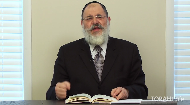 7:19
7:19
Addressing the Four Sons (7:19)
Look around at the people gathered around your seder table and address each one on their own level. Rabbi Nochem Kaplan describes the four sons and their blessings and needs.
Rabbi Nochum Kaplan (12)
-
 2:48
2:48
Freedom to Ask Questions (2:48)
Rabbi Kasriel Shemtov (5)
-
 7:54
7:54
Rabbi Elazar Ben Azariah (7:54)
Rabbi Eli Silberstein gives a light hearted explanation of Rabbi Elazar ben Azariah's aging.
Rabbi Eli Silberstein (139)
-
 15:15
15:15
This Poor Bread - Hei Lachma Anya (15:15)
Rabbi Eli Silberstein (139)
-
 4:10
4:10
The Right Approach to Ma Nishtana (4:10)
Ruth Landsman (3)
-
 4:41
4:41
"And You Shall Speak to Your Children" (4:41)
Ruth Landsman (3)
-
 8:22
8:22
Not by an Angel, Not by a Messenger (8:22)
Rabbi Eli Silberstein shares a deep insight by Rabbi Akivah Eiger, one of the most studied Torah giants of the 17th century, regarding a seeming contradiction in the texts relating the story of the tenth plague, the death of the first born. This fascinating idea proves relevant with regard to the mitzva we still practice today -- the redemption of the firstborn known as pidyon haben.
Rabbi Eli Silberstein (139)
-
 5:35
5:35
Ma Nishtana (The Four Questions) (5:35)
Ma Nishtana is perhaps the most well known parts of the seder. But dids you ever wonder why we ask questions on Passover? Why not ask questions on other Jewish holidays? In this segment, Rabbi Eli Silberstein will answer these questions and perhaps the most important question, "Why is this night different from all other nights?".
Rabbi Eli Silberstein (139)
-
 5:25
5:25
True Freedom (5:25)
The Exodus from Egypt took place over 3000 years ago- why are we still celebrating that freedom today? Rabbi Manis Friedman has the answer.
Rabbi Manis Friedman (248)
-
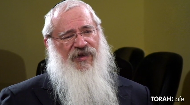 0:57
0:57
The Journey Out of Egypt (0:57)
Rabbi Manis Friedman (248)
-
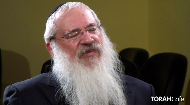 7:30
7:30
Passover: The Four Questions (7:30)
Rabbi Manis Friedman (248)
-
 1:16
1:16
Why Questions? (1:16)
Rabbi Manis Friedman (248)


